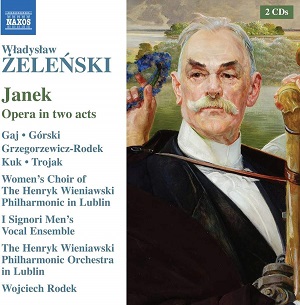
Władysław Żeleński (1851-1920)
Janek (1900)
Łukasz Gaj (tenor) Janek
Małgorzata Grzegorzewicz-Rodek (soprano) Bronka
Agnieszka Kuk (soprano) Marynka
Paweł Trojak (baritone) Stach
Dariusz Górski (bass) Marek
Dawid Jarząb (tenor) Highlander 1
Mateusz Słonina(bass) Highlander 2
I Signori Men’s Vocal Ensemble; Women’s Choir of the Henryk Wieniawski Philharmonic in Lublin;
Henryk Wieniawski Philharmonic in Lublin /Wojciech Rodek.
rec. 2021 Concert Hall of the Henryk Wieniawski Philharmonic in Lublin, Poland
Libretto available online only
Naxos 8.660521-22 [2 CDs: 89]
Here is a relatively unknown opera from the turn of the 20th century which involves a large orchestra and chorus. On the surface at least, it appears that this could be an important operatic rediscovery. Whether Janek actually lives up to that hope rather depends on how one responds to late 19th century Polish music. The booklet notes for this new Naxos release indicate that Władysław Żeleński was a successful composer who followed in the footsteps of Monuiszko in the development of a Polish national style of composition. Żeleński worked primarily in Warsaw and Kraków after completing his musical studies in Prague and Paris. Janek appears to have been greatly inspired by Mascagni’s Cavalleria Rusticana. The story of the opera is rather derivative of the Mascagni opera, although it exchanges the local Sicilian colours for those of the Tatra mountain region that borders both Poland and Slovakia. Żeleński’s music engages one by utilizing some the folk sounds and rhythms that originate in those highlands. The music that Żeleński conjures at these moments are among the most interesting pages of his score. The title character’s Bandit Song, and the whirlwind dance that follows it, are the most exciting sections of the opera. The majority of Zeklenki’s music fits into a fairly conservative mould, coming across as not really passionate enough for its tempestuous story. Ludomił German’s libretto is also far from being as dramatically effective as that for Cavalleria Rusticana. The first act is essentially an interminable 45-minute love scene, which makes it longer than the one in Tristan und Isolde, but without the inner tensions that make Wagner’s opera so riveting. This leaves all of the dramatic action to be lumped together in the second act. It’s a case of too little, too late.
The cast of young Polish singers includes no names that are immediately recognizable but they all make a valiant attempt to bringing dramatic life to this rarely-heard score. Incidentally, the score has been reconstructed by Paweł Pietruszewski, although the booklet does not provide any information about what that involved.
Łukasz Gaj tries to sound heroic as the bandit leader Janek, and he certainly gives a spirited account of the interesting Bandit Song. His tone is generally clean except when he ventures above the staff where he too often sounds strained. Bass Dariusz Górski has the happy job of injecting a little life into the final eight minutes of the tedious First Act. His bass is quite sizeable although it lacks sufficient firmness on sustained notes to be really comfortable for this listener. Paweł Trojak as the betrayed male character Stach is the most consistently reliable singer of the entire cast, revealing a medium-sized baritone of warmth and firmness.
The main female contingent includes Małgorzata Grzegorzewicz-Rodek as the inconstant Bronka. This soprano is definitely a spinto in the making, although her typically Central European white tone may not be to everyone’s taste. Much more impressive to my ears is Agnieszka Kuk as the wronged Marynka. When she sings softly she has an appealing timbre but it does turn a bit vinegary when she pushes beyond that. She proves herself to be enough of a dramatic soprano to bear watching.
The best feature of the recording is the participation of the orchestra and chorus, skilfully managed by Wojciech Rodek. He finds the unique colours of the score and deftly brings out what interest there is in Żeleński’s music. The recording is warm and naturally balanced, with the spacious acoustic of Lublin’s concert hall registering nicely. A Polish only libretto is available from the Naxos Website. The synopsis has enough queue points to be of service to the listener, and for once I rather doubt that having the actual dialogue translated would add much to the experience of this rather buttoned-up opera.
Mike Parr
Help us financially by purchasing from





















